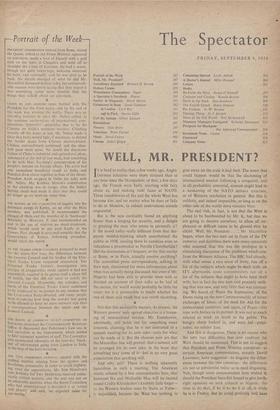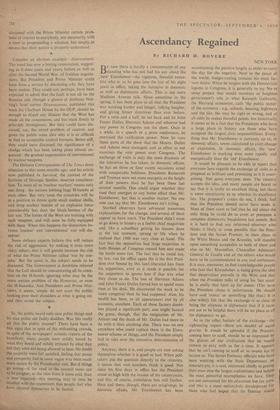WELL, MR. PRESIDENT?
IT is hard to realise that, a few weeks ago, Anglo- German relations were more strained than at any time since the Occupation; or that, a few days ago, the French were fairly snorting with fury about us, and making rude faces at NATO. Three touchdowns of Ike and the whole West has become kin; and no matter what he does or fails to do in Moscow, to submit reservations sounds ungrateful.
But is the new cordiality based on anything firmer than a longing for security, and a delight in greeting the man who seems to personify it? Jr the mood today really different from that des- perate wishful-thinking which anaesthetised the public in 1938, causing them to canonise even so ridiculous a peacemaker as Neville Chamberlain? Did the discussions at Chequers, or for that matter at Bonn, or in Paris, actually resolve anything? The assembled press correspondents, .sulking in their tent, clamoured for more information about what was actually being discussed; but even if Mr. Hagerty had been able to provide them with as detailed an account of their talks as he had of the menus, the world would probably be little the wiser; for it is permissible to doubt whether the two of them said much that was worth recording.
*
Not that this necessarily matters. At present, the Western powers' only agreed objective is a lessen- ing of international tension. Mr. Eisenhower, admittedly, still holds out for something more Concrete, claiming that he is not interested in a summit meeting for its own sake—only for what can be made of it. But the chances now are that the Macmillan line will prevail; that a summit, will be arranged for its own sake, in the hope that something may come of it—but in no very great expectation that anything will.
And why not? There is nothing inherently hazardous in such a meeting. The American alarm, echoed by a few commentators here, that Innocent Ike and Malleable Mac will be twisted round Crafty Khrushchev's knobbly little finger— as the Western leaders were by Stalin at Yalta— is unjustified, because the West has nothing to
give away on the scale it had then. The worst that could happen would be that the slackening' of international, tension following a congenial, and in all probability convivial, summit might lead to a weakening of the NATO defence structure, or of Western resolution in general. But this is unlikely, and indeed impossible, so long as on the other side of the world there remains Mao.
The real risk, in fact, is not that the West is about to be bamboozled by Mr. K, but that we are going to deceive ourselves; to allow all un- pleasant or difficult issues to be glossed over by cliche. 'Well, Mr. President . . .', Mr. Macmillan began, when the two men sat in front of the TV cameras; and doubtless there were many innocents who assumed that this was the prologue to a stimulating discussion of the problems which con- front the Western Alliance. The BBC had already, with What seems a nice sense of irony, run off a list of the subjects which might be dealt with; on ITV afterwards, some commentators ran off a list of the subjects that ought to have been dealt with; but in fact the two men said precisely noth- ing that was new, and very little that was interest- ing. We heard of Peace the Imperative; of the Dawn rising on the new Commonwealth; of better exchanges of Ideas; of the need for Aid for the undeveloped countries; and again, of Peace—this time with Justice as its partner. It was not so much relaXed as tired; an insult to the public. The hungry sheep looked in, and were fed—pulpi- tudes; no solider fare.
And this is dangerous. There is no reason why the very real difficulties that now confront the West should he minimised. This is not to suggest that President and Prime Minister conspired—aS certain American commentators, notably David Lawrence, have suggested—to disguise the differ- ences between the two countries : the differences are not so substantial today as to need disguising. Nor, though some commentators here wished it, should the President have felt bound to give forth- right opinions on such subjects as Algeria : the time to do that, if he is to do it .at all, is while he is in France. But he could perfectly well have
discussed with the Prime Minister certain prob- lems of interest to everybody, not necessarily with a view to propounding a solution, but simply to ensure that their nature is properly understood.
* Consider an obvious example : disarmament. The word has now a boring connotation, suggest- ing as it does years and years, before as well as after the Second World War, of fruitless negotia- tions. But President and Prime Minister could, have done a service by discussing why they have been useless. They could not, perhaps, have been expected to admit' that the fault is not all on the Russian side (though a glance at Anthony Nut- ting's brief survey Disarmament, published this week fOr Chatham House by the OUP, should be enough to dispel any illusion that the West has made all the concessions, and has stuck firmly to principle throughout). But they could have dis- cussed, say, the vexed problem of control, and given the public some idea why it is so difficult to find an acceptable control formula. Better still, they could have discussed the significance of a change which has been taking place almost un- noticed: the gradual supersession of conventional by nuclear weapons.
The Defence Correspondent of The Times drew attention to this some months ago; and his article now published in Survival, the journal of the Institute of Strategic Studies, deserves considera- tion. To most of us 'nuclear warfare' means only one thing: the nations lobbing huge H-bombs at each other. But very soon the countries will be in a position to throw quite small nuclear shells, and drop nuclear bombs of an explosive force considerably less than the block-busters of the last war. The forces of the West are training with such weapons, and will soon be fully equipped with them. When this happens the distinction be- tween 'nuclear' and 'conventional' war will dis- appear.
Some defence experts believe this will reduce the risk of aggression, by making it even more risky; others, that it will greatly increase the risk of what the Prime Minister called 'war by mis- take.' But the point is, the subject needs to be discussed. The Government is doubtless relieved that the Left should be concentrating all its atten- tion on the H-bomb, ignoring what may be the more serious problem of the H-mortar, or even the H-bazooka. And Presidents and Prime Min- isters, it seems, simply do not want the public looking over their shoulders at what is going on; and they avoid the subject.
So, the public heard only nice polite things said by nice polite old fuddy-duddies. Was this really all that the public wanted? There have been a few signs that in spite of the welcoMing crowds, in spite of the newspapers' ecstatic reports of the broadcast, many people were mildly bored by what they heard and mildly irritated by what they felt they were not being allowed to hear. No doubt the majority were left satisfied, feeling that peace and prosperity had in some vague way been made more secure by the Presidential visit. But if things go wrong--if the road to the summit turns out • to be rougher, or the view from it more arid, than is now expected—this meeting may in time be recalled with the resentment that people feel who have allowed themselves to be fooled.



































 Previous page
Previous page